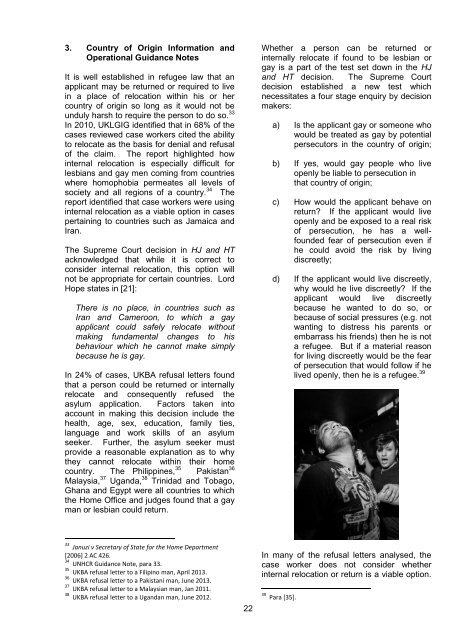Missing-the-Mark
Missing-the-Mark
Missing-the-Mark
You also want an ePaper? Increase the reach of your titles
YUMPU automatically turns print PDFs into web optimized ePapers that Google loves.
3. Country of Origin Information and<br />
Operational Guidance Notes<br />
It is well established in refugee law that an<br />
applicant may be returned or required to live<br />
in a place of relocation within his or her<br />
country of origin so long as it would not be<br />
unduly harsh to require <strong>the</strong> person to do so. 33<br />
In 2010, UKLGIG identified that in 68% of <strong>the</strong><br />
cases reviewed case workers cited <strong>the</strong> ability<br />
to relocate as <strong>the</strong> basis for denial and refusal<br />
of <strong>the</strong> claim. The report highlighted how<br />
internal relocation is especially difficult for<br />
lesbians and gay men coming from countries<br />
where homophobia permeates all levels of<br />
society and all regions of a country. 34 The<br />
report identified that case workers were using<br />
internal relocation as a viable option in cases<br />
pertaining to countries such as Jamaica and<br />
Iran.<br />
The Supreme Court decision in HJ and HT<br />
acknowledged that while it is correct to<br />
consider internal relocation, this option will<br />
not be appropriate for certain countries. Lord<br />
Hope states in [21]:<br />
There is no place, in countries such as<br />
Iran and Cameroon, to which a gay<br />
applicant could safely relocate without<br />
making fundamental changes to his<br />
behaviour which he cannot make simply<br />
because he is gay.<br />
In 24% of cases, UKBA refusal letters found<br />
that a person could be returned or internally<br />
relocate and consequently refused <strong>the</strong><br />
asylum application. Factors taken into<br />
account in making this decision include <strong>the</strong><br />
health, age, sex, education, family ties,<br />
language and work skills of an asylum<br />
seeker. Fur<strong>the</strong>r, <strong>the</strong> asylum seeker must<br />
provide a reasonable explanation as to why<br />
<strong>the</strong>y cannot relocate within <strong>the</strong>ir home<br />
country. The Philippines, 35 Pakistan 36<br />
Malaysia, 37 Uganda, 38 Trinidad and Tobago,<br />
Ghana and Egypt were all countries to which<br />
<strong>the</strong> Home Office and judges found that a gay<br />
man or lesbian could return.<br />
Whe<strong>the</strong>r a person can be returned or<br />
internally relocate if found to be lesbian or<br />
gay is a part of <strong>the</strong> test set down in <strong>the</strong> HJ<br />
and HT decision. The Supreme Court<br />
decision established a new test which<br />
necessitates a four stage enquiry by decision<br />
makers:<br />
a) Is <strong>the</strong> applicant gay or someone who<br />
would be treated as gay by potential<br />
persecutors in <strong>the</strong> country of origin;<br />
b) If yes, would gay people who live<br />
openly be liable to persecution in<br />
that country of origin;<br />
c) How would <strong>the</strong> applicant behave on<br />
return? If <strong>the</strong> applicant would live<br />
openly and be exposed to a real risk<br />
of persecution, he has a wellfounded<br />
fear of persecution even if<br />
he could avoid <strong>the</strong> risk by living<br />
discreetly;<br />
d) If <strong>the</strong> applicant would live discreetly,<br />
why would he live discreetly? If <strong>the</strong><br />
applicant would live discreetly<br />
because he wanted to do so, or<br />
because of social pressures (e.g. not<br />
wanting to distress his parents or<br />
embarrass his friends) <strong>the</strong>n he is not<br />
a refugee. But if a material reason<br />
for living discreetly would be <strong>the</strong> fear<br />
of persecution that would follow if he<br />
lived openly, <strong>the</strong>n he is a refugee. 39<br />
33 Januzi v Secretary of State for <strong>the</strong> Home Department<br />
[2006] 2 AC 426.<br />
34 UNHCR Guidance Note, para 33.<br />
35 UKBA refusal letter to a Filipino man, April 2013.<br />
36 UKBA refusal letter to a Pakistani man, June 2013.<br />
37 UKBA refusal letter to a Malaysian man, Jan 2011.<br />
38 UKBA refusal letter to a Ugandan man, June 2012.<br />
In many of <strong>the</strong> refusal letters analysed, <strong>the</strong><br />
case worker does not consider whe<strong>the</strong>r<br />
internal relocation or return is a viable option.<br />
39 Para [35].<br />
22


